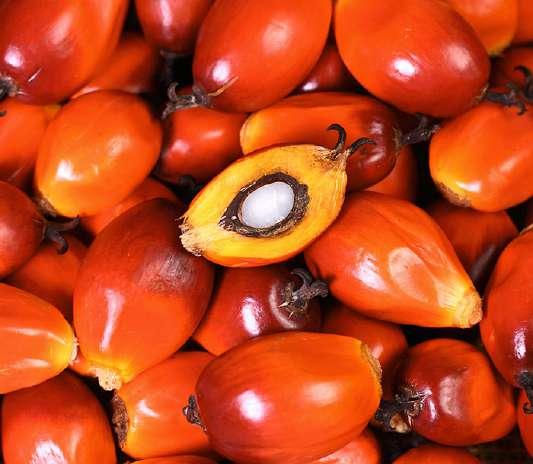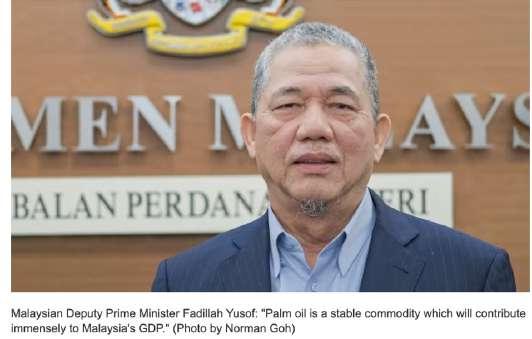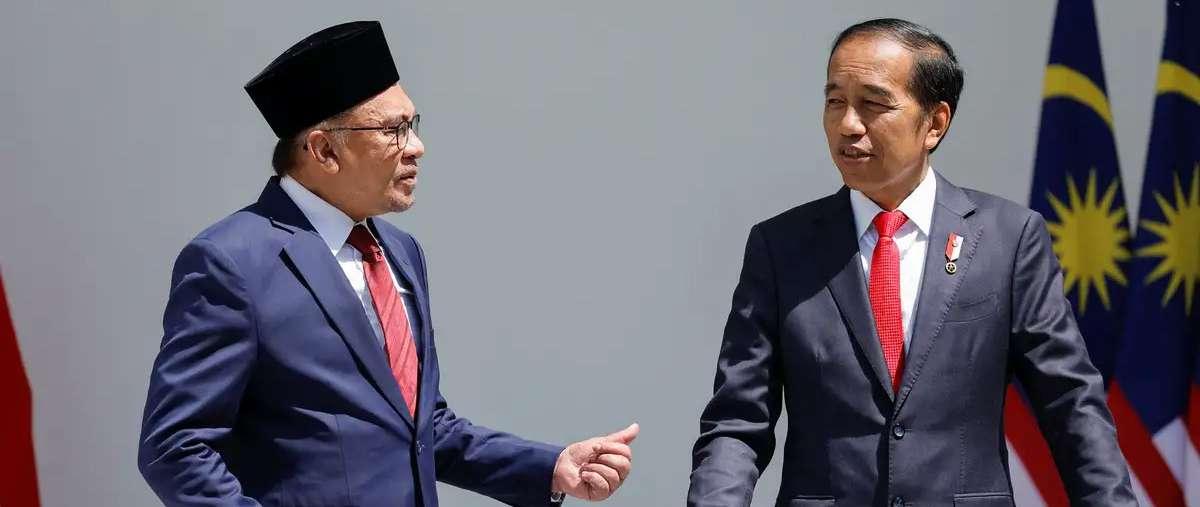
5 minute read
MALAYSIA WANTS PALM OIL HUBS IN EGYPT, SAUDI ARABIA: DEPUTY PM
KUALA LUMPUR - Malaysia plans to expand palm oil exports into Middle East and African markets by creating new export hubs in Egypt and Saudi Arabia, Malaysian Deputy Prime Minister Fadillah Yusof said in an interview with Nikkei Asia.
Fadillah, who is also Minister of Commodities and Plantation Industries, said his ministry and the Malaysian Palm Oil Council (MPOC) are trying to push further into emerging markets, which have recently seen their re-exports of the oil rise. Malaysia is the world’s second-largest exporter of palm oil after Indonesia. Its top importers include India, China and the Philippines. “There are a few strategies that we are looking at. Firstly, exploring new markets and at the same time strengthening relations with all the countries that are close to us as far as markets are concerned,” the deputy prime minister told Nikkei.
Fadillah spoke with the Egyptian ambassador to Malaysia, who said that Egypt is “keen” on being the regional hub for palm oil distribution. “They want to import more from us and they want Egypt to be the hub so they can spread it out to Africa.” “The same goes for the markets in the Middle East. Saudi Arabia, for example, is also interested [in being a hub] like Qatar.” Malaysia’s palm oil exports to the Middle East increased 32% last year and those to North Africa 51%.
Fadillah thinks China is also interested in increasing imports. “Palm oil is a stable commodity that will contribute immensely to Malaysia’s (GDP), although the world is facing several crises and disruption to the global supply chain,” Fadillah said.
The deputy prime minister’s comment on market diversification comes as exports to Europe trend down. Malaysia exported 181,379 tons of palm oil to the European Union, or 8% of its total, in the January-February period this year -- a decline of 22% from a year earlier, according to the MPOC. The largest dip was in Italy, which decreased its imports 59%, followed by Sweden at 37%.

Malaysia recently accused the EU of hurting small growers with the implementation of the bloc’s Deforestation Regulation. The new law is expected to be in force by the end of the year.
Michalis Rokas, the EU ambassador to Malaysia, met Fadillah last week and reassured him that the regulation will not affect Malaysia’s palm oil exports from existing agricultural land or burden small growers holding Malaysia Sustainable Palm Oil certification with extra costs.
According to a recent Financial Times’ report, Britain would eliminate import tariffs on palm oil from Malaysia once the European nation and the Comprehensive and Progressive Agreement for Trans-Pacific Partnership reach an agreement on Britain’s entry to the bloc.
Fadillah told Nikkei that the government is committed to ensuring sustainable palm oil plantations while adhering to international standards aimed at protecting the environment. “We want our forest coverage to be not less than 50% in Malaysia,” he said. “Forest coverage stands at about 54% in Malaysia. For palm oil, [land allocated to plantations] is 6.5 million acres,” with only about 5.8 million acres currently being used.
Malaysia and Indonesia last year announced that the two countries will send a delegation to Brussels to discuss the impact of the EU regulation. Fadillah said that both will focus on explaining their position to the EU on sustainability mechanisms and programs for limiting deforestation.
He added that the two countries need the EU to understand that small farmers comprise sizable indigenous groups who rotate crops and let some land remain fallow. Fadillah hopes the EU will consider exempting small palm oil farmers from the regulation.
In the meantime, Fadillah said that Malaysia plans to strengthen its market position by focusing on exports of downstream and high-value-added products including oleochemicals, specialty fats and health supplements.
Fadillah is a senior leader of Gabungan Parti Sarawak (GPS), a political party based in Borneo and one that represents the growing influence of the region in the federal government. After the general election last November, the Pakatan Harapan coalition led by Prime Minister Anwar Ibrahim formed a ruling bloc that includes the GPS and other Borneo-based parties. “For now, I would say as far as the unity government is concerned, I am confident that [it] will continue to be stable and strong,” Fadilah said. “Everyone has given their commitment to making sure that this government will stay for the sake of stability and focus on putting Malaysia back on track.”
JOKOWI: MALAYSIA, INDONESIA AKAN MENJADI
Produsen Kelapa Sawit Terbesar Di Dunia Jika
KUALA LUMPUR: Malaysia dan Indonesia - negara produsen kelapa sawit terbesar di dunia, seharusnya bekerja sama untuk melawan kebijakan perdagangan diskriminatif Uni Eropa (UE).
Presiden Indonesia, Joko Widodo, mengatakan Malaysia dan Indonesia akan menjadi produsen minyak kelapa sawit mentah (CPO) dan minyak kelapa sawit terbesar di dunia dengan bekerja sama, sehingga memudahkan penetrasi pasar dan pengelolaan harga.
Dalam wawancara dengan Media Prima menjelang Asean Summit di Jakarta bulan ini, Jokowi mengatakan bahwa tanpa kerja sama yang kuat, kedua negara akan menghadapi kesulitan dalam mengelola praktik diskriminatif UE. “Janganlah kita melihat Indonesia dan Malaysia bersaing satu sama lain, kita akan kalah bersama-sama. Kita perlu bersatu. “Saya yakin bahwa kita dapat menghadapi dan menyelesaikan masalah ini jika kita bersatu,” katanya.
Ia mengatakan bahwa Indonesia, yang menjadi ketua ASEAN tahun ini, akan terus menjadi penggagas upaya untuk meyakinkan UE bahwa praktik mereka sesuai dengan peraturan baru yang ketat mengenai deforestasi. “Sebanyak 16 juta orang bekerja di industri kelapa sawit di Indonesia. “Indonesia akan terus menjadi penggagas dalam hal ini, kami tidak ingin melihat adanya praktik diskriminatif,” katanya.
Pada bulan Desember tahun lalu, UE menyetujui undangundang baru yang mengharuskan perusahaan memastikan komoditas yang dijual di UE tidak berasal dari lahan yang ditebangi hutan. Komoditas seperti kayu, karet, daging sapi, kulit, kakao, kopi, minyak kelapa sawit, dan kedelai tidak akan masuk ke pasar UE kecuali terbukti “bebas deforestasi”
Indonesia dan Malaysia - yang menyumbang sekitar 80 persen produsen kelapa sawit dunia - telah mengajukan kasus terpisah ke Organisasi Perdagangan Dunia, dengan mengatakan bahwa langkah ini bersifat diskriminatif dan merupakan hambatan perdagangan.
Produsen kelapa sawit mengatakan bahwa mereka telah mengambil langkah untuk memenuhi persyaratan UE, termasuk meningkatkan standar sertifikasi minyak kelapa sawit berkelanjutan nasional dan meningkatkan perlindungan lingkungan dan standar keamanan pangan, tetapi blok tersebut terus memberlakukan pembatasan baru.
Data dari Malaysian Palm Oil Board menunjukkan bahwa pada tahun 2022, Malaysia mengekspor 15,72 juta metrik ton (MT) minyak kelapa sawit dengan total pendapatan sebesar RM135 biliun.
India, China, Turki, Belanda, Kenya, Filipina, Pakistan, Jepang, Arab Saudi, dan Iran adalah pembeli utama Malaysia, dengan total 9.809.271 MT produk kelapa sawit, yang merupakan 62,4 persen dari total ekspor minyak kelapa sawit negara tersebut. Negara-negara UE secara total hanya mengimpor 1.329.352 MT dari total ekspor minyak kelapa sawit negara tersebut.
Wakil Perdana Menteri dan Menteri Perkebunan, Fadillah Yusof, setelah bertemu dengan Menteri Koordinator Bidang Perekonomian Indonesia, Airlangga Hartarto di Jakarta awal tahun ini, mengatakan kedua negara telah sepakat untuk mengirim misi bersama guna menyampaikan fakta-fakta ilmiah, manfaat ekonomi, dan praktik terbaik industri kepada UE.
Perdana Menteri Datuk Seri Anwar Ibrahim, setelah pertemuan dengan Jokowi, mengatakan kedua negara telah sepakat untuk memperkuat kerjasama melalui Dewan Negaranegara Produsen Minyak Kelapa Sawit guna meningkatkan pasar minyak kelapa sawit dan melawan diskriminasi.











